
Friedrich Robert Donat was an English actor. He is best remembered for his roles in Alfred Hitchcock's The 39 Steps (1935) and Goodbye, Mr. Chips (1939), winning for the latter the Academy Award for Best Actor.

Sir John Mills was an English actor who appeared in more than 120 films in a career spanning seven decades. He excelled on camera as an appealing British everyman who often portrayed guileless, wounded war heroes. In 1971, he received the Academy Award for Best Supporting Actor for his performance in Ryan's Daughter.

Margaret Mary Day Lockwood, CBE, was a British actress. One of Britain's most popular film stars of the 1930s and 1940s, her film appearances included The Lady Vanishes (1938), Night Train to Munich (1940), The Man in Grey (1943), and The Wicked Lady (1945). She was nominated for the BAFTA Award for Best British Actress for the 1955 film Cast a Dark Shadow. She also starred in the television series Justice (1971–74).
Walter Greenwood was an English novelist, best known for the socially influential novel Love on the Dole (1933).
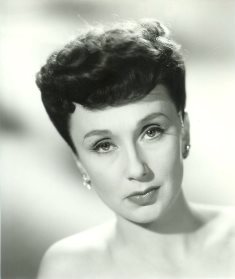
Georgette Lizette "Googie" Withers, CBE, AO was an English entertainer. She was a dancer and actress, with a lengthy career spanning some nine decades in theatre, film, and television. She was a well-known actress and star of British films during and after the Second World War.

The Wooden Horse is a 1950 British World War II war film directed by Jack Lee and starring Leo Genn, David Tomlinson and Anthony Steel. It is based on the book of the same name by Eric Williams, who also wrote the screenplay.

Dora May Broadbent,, known as Dora Bryan, was a British actress of stage, film and television.

Nigel Dennis Patrick Wemyss-Gorman was an English actor and stage director born into a theatrical family.

The Guinea Pig is a 1948 British film directed and produced by the Boulting brothers, known as The Outsider in the United States. The film is adapted from the 1946 play of the same name by Warren Chetham-Strode.

The Magic Box is a 1951 British Technicolor biographical drama film directed by John Boulting. The film stars Robert Donat as William Friese-Greene, with numerous cameo appearances by performers such as Peter Ustinov and Laurence Olivier. It was produced by Ronald Neame and distributed by British Lion Film Corporation.

Lady Godiva Rides Again is a 1951 British comedy film starring Pauline Stroud, George Cole and Bernadette O'Farrell, with British stars in supporting roles or making cameo appearances. It concerns a small-town English girl who wins a local beauty contest by appearing as Lady Godiva, then decides to pursue a higher profile in a national beauty pageant and as an actress.

Dorothy Renée Ascherson, known professionally as Renée Asherson, was an English actress. Much of her theatrical career was spent in Shakespearean plays, appearing at such venues as the Old Vic, the Liverpool Playhouse, and the Westminster Theatre. Her first stage appearance was on 17 October 1935, aged 20, and her first major film appearance was in The Way Ahead (1944). Her last film appearance was in The Others (2001).

The Winslow Boy is a 1948 British drama film adaptation of Terence Rattigan's 1946 play The Winslow Boy. It was made by De Grunwald Productions and distributed by the British Lion Film Corporation. It was directed by Anthony Asquith and produced by Anatole de Grunwald with Teddy Baird as associate producer. The adapted screenplay was written by de Grunwald and Rattigan based on Rattigan's play. The music score was by William Alwyn and the cinematography by Freddie Young.
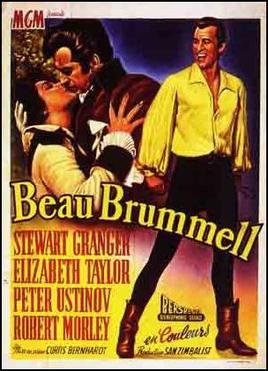
Beau Brummell is a 1954 British historical film released by Metro-Goldwyn-Mayer. It was directed by Curtis Bernhardt and produced by Sam Zimbalist from a screenplay by Karl Tunberg, based on the 1890 play Beau Brummell by Clyde Fitch. The play was previously adapted as a silent film made in 1924 and starring John Barrymore as Beau Brummell, Mary Astor, and Willard Louis as the Prince of Wales.
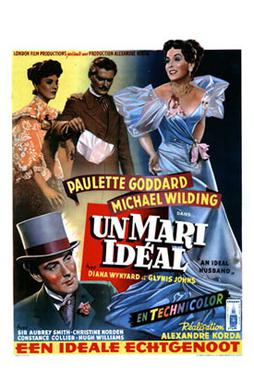
An Ideal Husband, also known as Oscar Wilde's An Ideal Husband, is a 1947 British comedy film adaptation of the 1895 play by Oscar Wilde. It was made by London Film Productions and distributed by British Lion Films (UK) and Twentieth Century-Fox Film Corporation (USA). It was produced and directed by Alexander Korda from a screenplay by Lajos Bíró from Wilde's play. The music score was by Arthur Benjamin, the cinematography by Georges Périnal, the editing by Oswald Hafenrichter and the costume design by Cecil Beaton. This was Korda's last completed film as a director, although he continued producing films into the next decade.
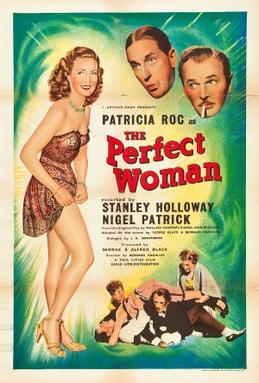
The Perfect Woman is a 1949 British farce comedy film directed by Bernard Knowles and written by George Black, Jr and J. B. Boothroyd, based upon a play by Wallace Geoffrey and Basil Mitchell. The screenplay concerns a scientist who creates a robotic woman in his lab.
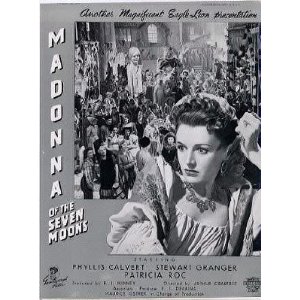
Madonna of the Seven Moons is a 1945 British drama film starring Phyllis Calvert, Stewart Granger and Patricia Roc. Directed by Arthur Crabtree for Gainsborough Pictures, the film was produced by Rubeigh James Minney, with cinematography from Jack Cox and screenplay by Roland Pertwee. It was one of the Gainsborough melodramas of the mid-1940s popular with WW2-era female audiences.
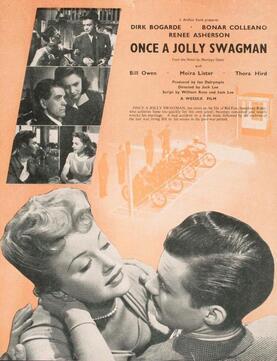
Once a Jolly Swagman is a 1949 British film starring Dirk Bogarde, Bonar Colleano, Bill Owen, Thora Hird and Sid James. It was written by William Rose and Jack Lee, based on the 1944 novel of the same title by Montagu Slater.

As Long as They're Happy is a 1955 British musical comedy film directed by J. Lee Thompson and starring Jack Buchanan, Susan Stephen and Diana Dors. It is based on the 1953 play of the same name by Vernon Sylvaine. It was shot in Eastmancolor at Pinewood Studios near London with sets designed by the art director Michael Stringer.
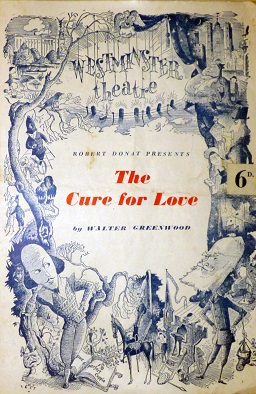
The Cure for Love is a comedy play by the British writer Walter Greenwood which premiered in 1945. Its West End run lasted for 219 performances at the Westminster Theatre between July 1945 and January 1946. Amongst the cast were Robert Donat, Renée Asherson, Charles Victor, Marjorie Rhodes and Joan White. The play portrays the return of an easy-going soldier to his Lancashire hometown after the Second World War. He falls in love with a young woman boarding at his mother's house, but struggles to break away from his faithless and calculating fiancée who intends to hold him to their engagement.


















